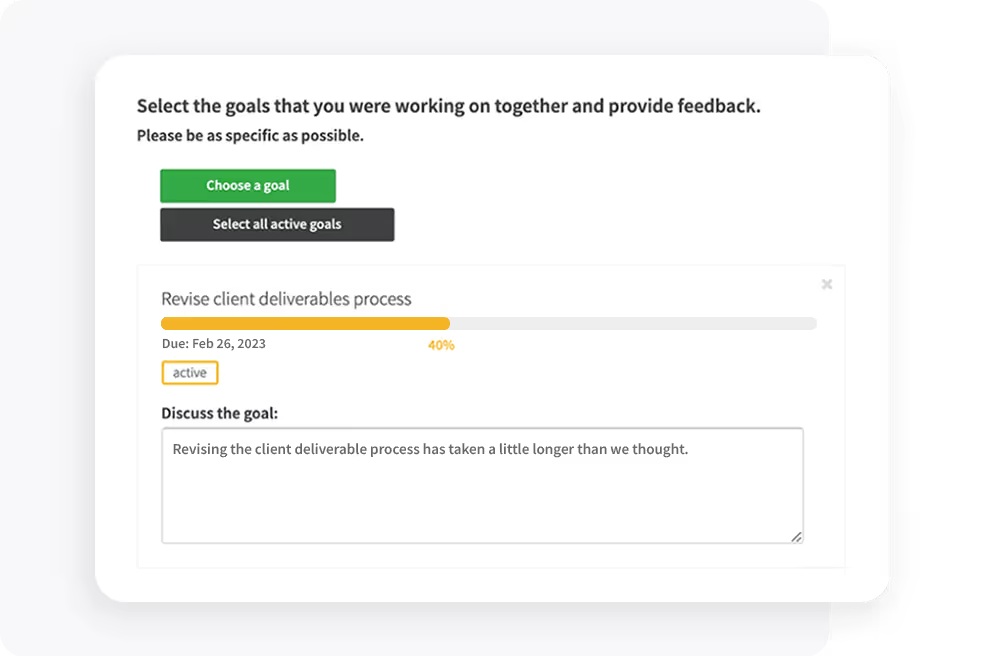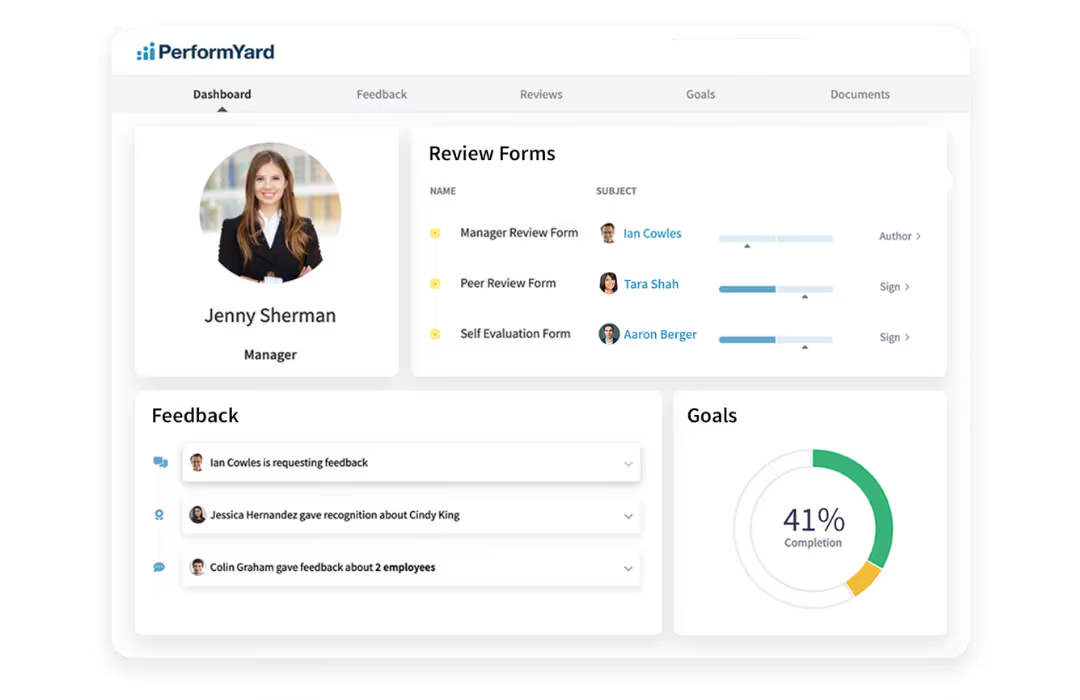Performance Management in Education: Best Practices & Processes
You need a hyper-customized approach to effectively manage performance in the education sector. Businesses have changed to match modern needs, so schools should change too. Here's how to establish a modern performance management process tailored for education.
Understanding the Shift
In the past, performance was mainly focused on test scores and teacher evaluations. However, modern education recognizes the need for a more holistic approach. It's not only about test scores. Your goal is to create lifelong learners who think critically and handle future challenges.
Moreover, it's important to acknowledge the dynamic needs of education. For example, consider the following:
- The education sector serves many different people, like students, parents, teachers, and administrators. They all have different needs.
- Education is more than just academics; it's about personal and social growth too.
- The learning process is ongoing, and performance management should reflect that.
Establishing a Performance Management Process
There is no one-size-fits-all approach. But, these critical steps can guide a process unique to organizations in education.
1. Set Clear Performance Goals
What do you aim to achieve with your performance management system? Possible objectives include:
- Enhancing student engagement and participation
- Improving teacher-student relationships
- Fostering a culture of continuous professional development for educators
- Strengthening curriculum delivery

2. Embrace a Multi-faceted Approach
Modern performance management in education should be comprehensive. Consider the following components:
- Instead of meeting once a year, make sure to meet with teachers regularly. This way, you can get feedback and make any necessary adjustments.
- Move beyond test scores. Consider metrics like student engagement, classroom environment, and extracurricular involvement.
- Create systems for feedback loops where students, parents, and educators can give feedback. This 360-degree feedback system can offer invaluable insights.
3. Empower Through Technology
Leverage technology to streamline the performance management process:
- Students can display their work, progress, and areas of improvement using a digital portfolio.
- Use online platforms for educators to give and receive real-time feedback.
- Use data analytics tools to track and analyze performance metrics. This will help you make better decisions.

4. Foster a Growth Mindset
Encourage a culture where mistakes are viewed as learning opportunities. Whether it's a struggling student or an experimenting teacher, the main goal is to grow and improve.
5. Continuous Iteration
The education landscape is ever-evolving. Regularly review and adjust your performance management process. Maybe a different way of teaching is becoming popular or education is changing focus. Stay adaptable and open to change.
Revisiting Performance Reviews for Teachers
Performance reviews are a cornerstone of professional development and growth. They provide teachers with insights into strengths and areas that need improvement. They can boost morale and motivation, leading to better outcomes in the classroom. And, they can assure parents that their children receive a consistent quality of education.
When creating a new performance management system, it's important to revisit the review process too. Consider the following:
- Performance reviews should be a two-way dialogue. Encourage teachers to self-evaluate. Ask for their perspectives on performance, challenges faced, and support needed.
- Look beyond just classroom performance. Consider the educator's contribution to extracurricular activities. Are they involved in school committees? Do they participate in introducing innovative teaching methods?
- Incorporate feedback from students, peers, and even parents. Different perspectives can provide a more rounded view of an educator's performance.
- Ensure performance metrics are clear, objective, and known to the educators in advance. This transparency can reduce anxiety and potential disputes.
- Focus on Constructive Feedback: The goal is to help educators grow, not to demotivate them. Ensure feedback is constructive, actionable, and delivered empathetically.
- Those conducting the reviews should undergo regular training. Ensure they are equipped to provide unbiased, constructive, and meaningful feedback.
- After the review, give teachers the support they need to improve, like training, resources, or mentorship.
- Maintain a record of all reviews. This not only serves as a reference for future evaluations but also allows educators to reflect on their growth journey.
Example Phrases & Comments for Reviews
Positive Feedback Examples
- Student Engagement: "Your ability to engage and motivate students is outstanding. You consistently create a learning environment that is both stimulating and supportive, which greatly enhances student interest and participation."
- Innovative Teaching Methods: "Your innovative approach to teaching has been very effective in improving student learning outcomes. Your use of diverse teaching methods and technologies caters to different learning styles, making your lessons more accessible and engaging."
- Professional Development: "Your commitment to professional development is commendable. By continually seeking to enhance your own skills and knowledge, you're setting a great example for your colleagues and contributing to the overall improvement of our educational programs."
- Collaboration with Colleagues: "Your willingness to collaborate with colleagues and share best practices has contributed significantly to a positive and productive work environment. This teamwork has been beneficial not only for staff but also for the students."
- Parental Communication: "Your communication with parents has been exceptional. By keeping them informed and involved in their children's education, you've fostered a strong school-community relationship and enhanced student support."
Critical Feedback Examples
- Classroom Management: "While your instructional skills are strong, there's room for improvement in classroom management. Developing more strategies to maintain a focused and orderly classroom will enhance the learning environment for all students."
- Differentiation of Instruction: "Tailoring your teaching to meet the diverse needs of all students is a vital skill. Focusing more on differentiating your instruction can help in addressing the varying abilities and learning styles in your classroom."
- Use of Assessment Data: "Leveraging assessment data more effectively to inform instruction could improve student learning outcomes. Analyzing and using this data can help in identifying areas where students need more support or enrichment."
- Incorporating Feedback: "Actively incorporating feedback from students and peers into your teaching practice can further enhance your effectiveness as an educator. This can lead to continuous improvement in your instructional methods."
- Work-Life Balance: "In such a demanding profession, it's important to maintain a healthy work-life balance. Ensuring you take time for self-care will sustain your energy and passion for teaching in the long term."
Closing Thoughts on Performance Management in Education
Modern performance management requires an organization to consider their unique needs. Furthermore, in education, it's about fostering an environment of continuous growth and improvement. Set clear goals. Embrace a holistic approach. Leverage technology. These critical steps ensure an organization can meet or exceed their performance goals.




